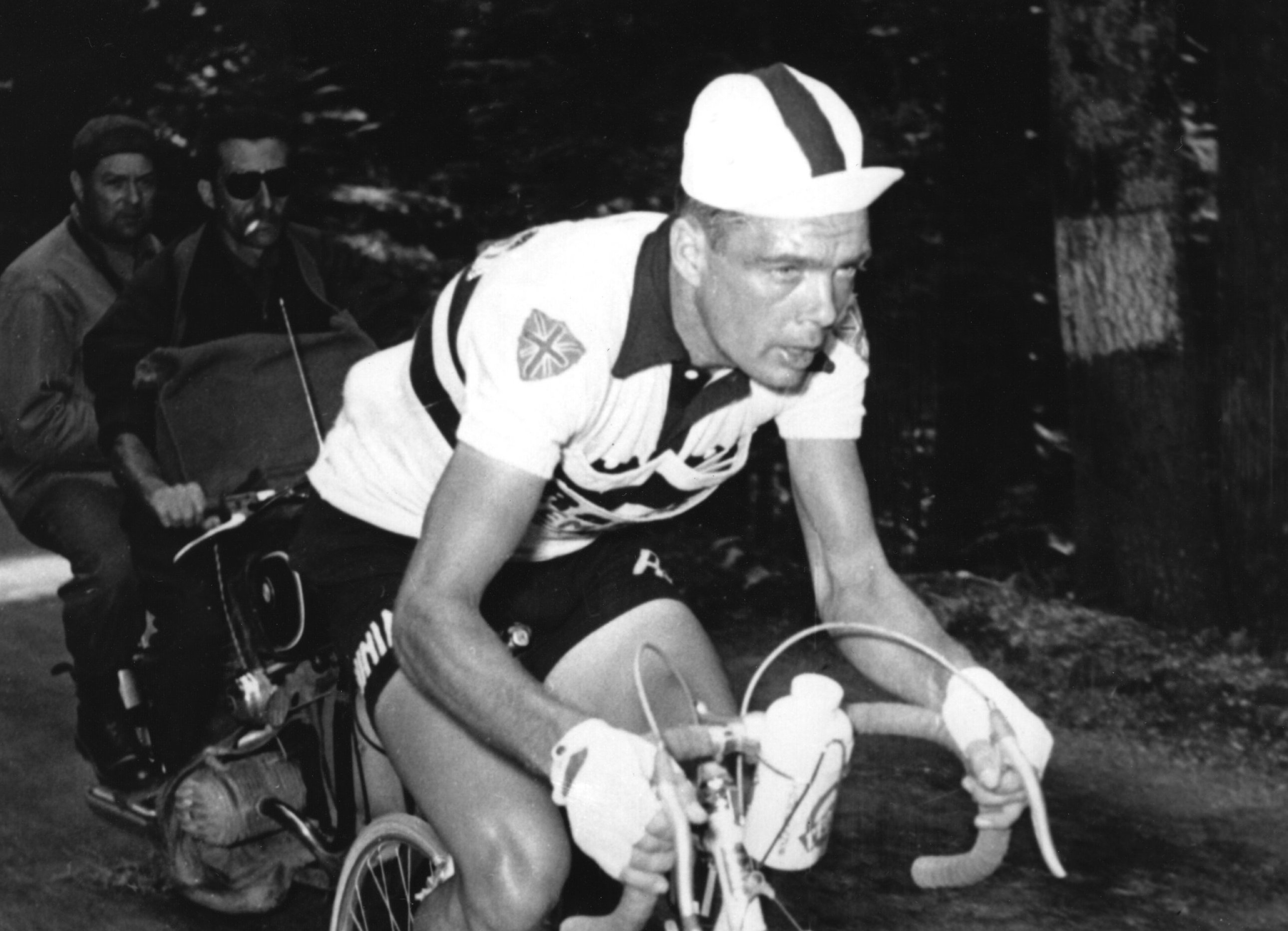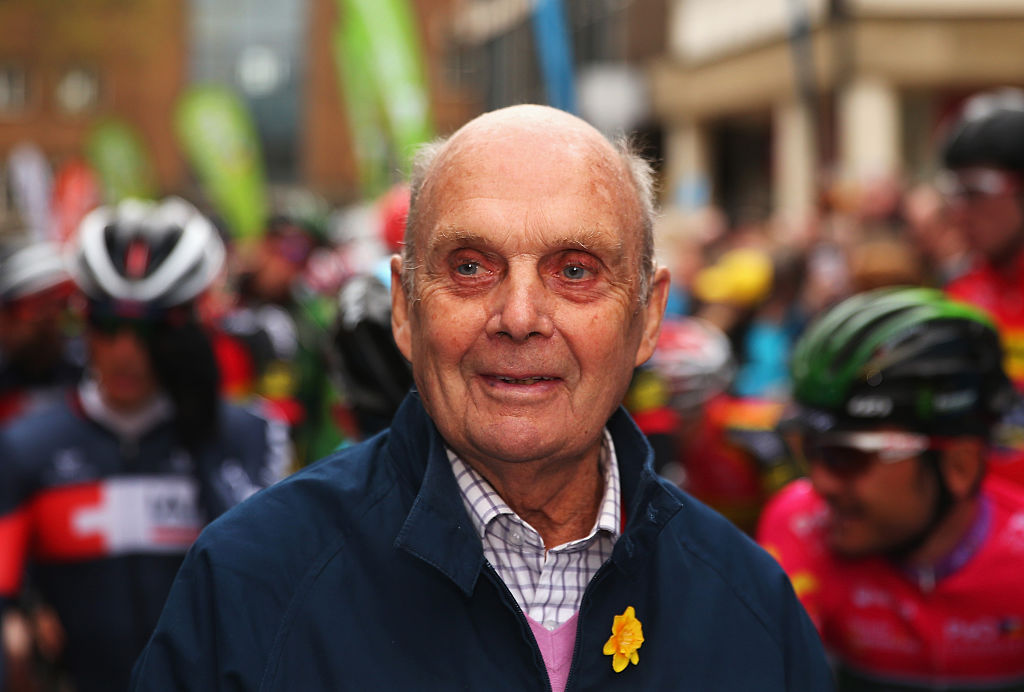Obituary: Brian Robinson 'the first of his kind'
Britain's first Tour de France stage winner carved a path for later generations

When the Tour de France visited Yorkshire in July 2014, it could not have been a more appropriate homage for Brian Robinson.
After all, it was Robinson, Yorkshire born and bred, who six decades previously had kickstarted the interest of British cyclists in racing in Europe and ultimately in the Tour de France.
Robinson, who died last week aged 91, has rightly been described as the pioneer for British cycling on the other side of the English Channel. But it's not fully understood quite how fully Robinson enacted this role.
He may not have been the first Briton to take part in the Tour de France. But he was, together, with teammate Tony Hoar, one of the first two to finish, at a time where no rider from Britain had ever significantly impacted on road racing in mainland Europe.
Then over the next six editions, be it alone or with 11 other compatriots like in 1961, Robinson became a regular fixture in the Tour lineups, and in other international racing.
It was perhaps only logical that Robinson was the first British rider to win a Tour de France stage. He then added a second.
Before retiring Robinson also claimed the first British finish on a Monument podium, coming third in Milan-San Remo in 1957. He could probably have done better but instead led out his Spanish friend Miguel Poblet. He also captured the country's first-ever victory in France’s second toughest stage race, the Criterium du Dauphiné, in 1961.
Get The Leadout Newsletter
The latest race content, interviews, features, reviews and expert buying guides, direct to your inbox!
Race by race, victory by victory, a key British claim in continental road racing had, at last, been staked.
The chanciest of starts
Meeting him at his home in Mirfield, Yorkshire, it often seemed hard to grasp that the mild-mannered, quietly jovial Robinson had such a trailblazing role in British cycling.
Helping his father, a village undertaker, lay out corpses in his teens suggests a phlegmatic, pragmatic side to Robinson’s character. He was inspired to make a career of cycling by photos of bike riders in magazines his brother Desmond had brought back from France in the early 1950s. That indicates he had a powerful sense of adventure as well. Combine the two, and perhaps anything was possible.
With stage racing banned in the UK until 1942 and road racing still in its infancy in the 1950s, the British breakthrough into racing abroad was a chancy affair from the outset.
Robinson once recalled, how British officials secured an invite to the Tour for a national team as “the result of a drunken night somewhere, maybe the World Championships,” where the presumably inebriated Tour organisers showed more compassion than usual for underdogs like Great Britain.
"We were riding on the britches of our backsides," Robinson graphically put it in an interview a few years ago.
"We just read all we could, and learnt what we could before we went. There was nobody with any experience of racing at that level in our country."
Combined with just half a season of racing in Europe as a team, with the team manager Syd Cozens only experienced in track racing, Robinson’s most trusted source of information was a journalist, Jock Wadley, himself a pioneer of English-speaking journalism in mainland European racing.
But advice would only get Robinson so far.
"This [the UK] was one world, and that [the European racing scene] was another. It wasn't just like a step up from what we knew in Britain, though: they were so fast, it was more like going up an entire storey of flats," was how Robinson once put it.
Of his ten teammates, all bar two fell foul of heat exhaustion or the interminable punctures that affected his squad and only he and Hoar finished. But as Robinson told me in 2014 prior to the Tour's arrival in Yorkshire, his worst problem was the noise.
"People running alongside you and yelling and screaming in the mountains stages, that was very hard. 'Boom-boom-boom' in your head. You don't get that in the Yorkshire Dales."
As none of the British riders had raced more than a week, the worst thing was the uncertainty of how far they would make it.
"Each night, we'd be looking at each other round the dinner table, wondering who would abandon next. We were like the 10 green men, hanging on the wall."
Yet his pragmatic spirit kicked in when he made it into Paris, with nearly no sense at all of making history.
"It was a job to do, and you got on with it. The better you did it, the better you got paid," he said.
In his case that was 20 pounds a week plus expenses, which might be less than an average pro now, but was way more than the 12 pounds 13 shillings and sixpence he got paid at the time in his winter job as a builder in the family business.
No going back
Once he made it on the Continent, Robinson kept going and going.
He had no sense of homesickness, he recalled, despite living abroad for eight or nine months of the year. His only concession to those feelings was a trip to the local fish and chip shop the moment he got back home to Yorkshire.
His determination to succeed in racing was clear and his sale of the family car one year or having to ride the Vuelta as a ‘gun for hire’ in a mixed team with Switzerland another, are both different kinds of testimony regarding his tenacity at keeping his career afloat.
If his first stage win in the Tour, in 1958, was something of a damp squib, coming after another rider had been disqualified, his second, taken on another transition stage in 1959 was much more dramatic.
A solo breakaway late in the third week culminated in a victory with a 20-minute advantage. But in both cases, Robinson was practical about the consequences, even if he was conscious at the back of his mind, he was a trailblazer.
“I wasn’t that patriotic,” he once told me, “it just meant my money was a bit better the following year.”
Yet as he grew more successful, and began regularly elbowing with cycling’s more established figures, the more prestigious perks of the job would start emerging as well. Blessed with a prodigious memory, years later Robinson could recollect in detail his travelling in high-paying criteriums for weeks at a time in Spain, sharing a car with Federico Martin Bahamontes, Jacques Anquetil and Andre Darrigade to do so.
At the other end of the scale, though, would come participations in events like the Vuelta in 1956 at a time when the food in Spain was “terrible” and the riders would survive on a diet of eggs for almost the entire race.
In Robinson’s case, his ‘Spanish diet’ sparked dysentery, and indeed if his racing skills served him well on single stages of week-long races, his stomach issues would prevent him from ever getting a higher place overall in the Grand Tours than 14th in one Tour de France and eighth in the Vuelta a España.
Robinson’s career was ultimately a short one, ending when he was 31 because he was “tired of living out of a suitcase.”
By then, in late 1962, the flame of British interest in the sport abroad had been passed on.
His friend and rival Tom Simpson was already starting to make a name for himself, Barry Hoban was on the point of beginning his professional career and above all his role of inspiring other riders had been achieved.
According to Roule Britannia, a history of British cycling in the Tour de France by William Fotheringham, Robinson drew talented cyclists from the UK to France.
“I hadn’t been a great champion at home before I came over, so guys would look at my results in the Tour, think they were no worse and wonder if they could do the same.”
The barrier, arguably more psychological than real, then, had thus been broken. British cycling would never be the same.
And as for Robinson himself? After returning to the building industry post retirement, as he once told The Independent, in terms of his cycling achievements.
“I got buried for 40 years.” Perhaps unsurprisingly in a country with a scant tradition in international road racing. “Once I retired, there was no publicity about cycling, particularly for guys whose careers were finished.”
The Tour de France start in Yorkshire, he said, had changed all that, to the point where “ whenever I go to the supermarket, it's: 'Hello, Brian.'"
But Robinson kept on riding regardless of the public attention or lack of it, going out with his training group until well into his eighties.
If he ever had problems with the lack of recognition, it may have helped that he was gifted with a rather dark, self-deprecating sense of humour.
He once joked after a lengthy interview when he’d provided far more information than required, “you can use all the bits you don’t need now for when you’re writing up my obituary.”

The legacy
And for all the patchy recognition, his legacy lived on, even trickling through to riders of younger generations, either directly through his own racing or through those he inspired.
“It was quite obvious that as a young cyclist, pre-Sky there were very few examples of success to go by and Brian was obviously one of them and one of the earlier ones, too,” Charly Wegelius, a former pro who grew up in Yorkshire in the 1990s and who is now head sports manager at EF Education-EasyPost, tells Cyclingnews.
“When I was quite young, maybe 16 or 17, the guy who worked at the local bike shop took me to Tom Simpson’s grave and most of the conversations I heard from that era were more about Tom. Robinson’s generation was more of a historical thing for me.
"Nonetheless when you read up about those guys like Brian, and what they went through, very little has actually changed between the scenarios.”
Robinson did get some belated call-ups to fame, being an ambassador at the Tour de France Yorkshire Grand Départ and the Tour de Yorkshire. But it was fitting, too, that he became a president of the Dave Rayner Fund, which still helps young British riders race abroad.
“I think what stands out about him, though, is he didn’t have any examples to go for himself,” says Wegelius.
“He was walking on clean snow and laid the first footprints. In cycling terms, it’s like going to another planet, it was a complete leap into the unknown. He was the first of his kind.”
Brian Robinson: born Yorkshire, UK, November 3rd, 1930; died Yorkshire, UK, October 25th, 2022.
Alasdair Fotheringham has been reporting on cycling since 1991. He has covered every Tour de France since 1992 bar one, as well as numerous other bike races of all shapes and sizes, ranging from the Olympic Games in 2008 to the now sadly defunct Subida a Urkiola hill climb in Spain. As well as working for Cyclingnews, he has also written for The Independent, The Guardian, ProCycling, The Express and Reuters.
